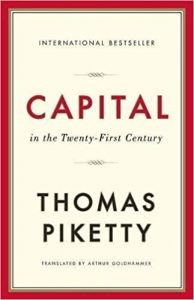Review Capital in the Twenty-First Century
by THOMAS PIKETTY
Description
Thomas Piketty discusses the modern state of wealth inequality and the major role that capital distribution plays in it. He seeks to find answers to the factors that govern the political economy and how inequality evolved in it. Piketty delves into an analysis of the modern economic growth rate and how capital and wealth concentration contribute to inequality. He uses past data to unveil economic and social patterns that repeat over time and play a major factor in the modern state of wealth inequality. He cites Marx’s past work and ideas on the potential rate of future inequality and assesses it with the economic and political state of the world in the 21st century.
Review
This book is not only for an economist or a businessperson but for every profession to read. Piketty creates a good discussion on the current state of the world with regard to wealth distribution and how this led to inequality and conflict. He uses data to examine how wealth concentration and inequality evolved simultaneously and how these economic factors underpin politics.
In Piketty’s extensive historical analysis of capital, he states that once the return on capital surpasses income and output growth, capitalism creates a dangerous form of inequality that destroys the moral factors on which democracy was formed.
About the Author
THOMAS PIKETTY is the Director of Studies at L’École des Hautes Études en Sciences Sociales. He is also a professor at the Paris School of Economics.
Table of Contents
Acknowledgments
Introduction
Part One: Income and Capital
- Income and Output
- Growth: Illusions and Realities
Part Two: The Dynamics of the Capital / Income Ratio
- The Metamorphosis of Capital
- From Old Europe to the New World
- The Capital / Income Ratio Over the Long Run
- The Capital-Labor Split in the Twenty-First Century
Part Three: The Structure of Inequality
- Inequality and Concentration: Preliminary Bearings
- Two Worlds
- Inequality of Labor Income
- Inequality of Capital Ownership
- Merit and Inheritance in the Long Run
- Global Inequality of Wealth in the Twenty-First Century
Part four: Regulating Capital in the Twenty-First Century
- A Social State for the Twenty-First Century
- Rethinking the Progressive Income Tax
- A Global Tax on Capital
- The Question of the Public Debt
Conclusion
Notes
Contents in Detail
List of Tables and Illustrations
Index
